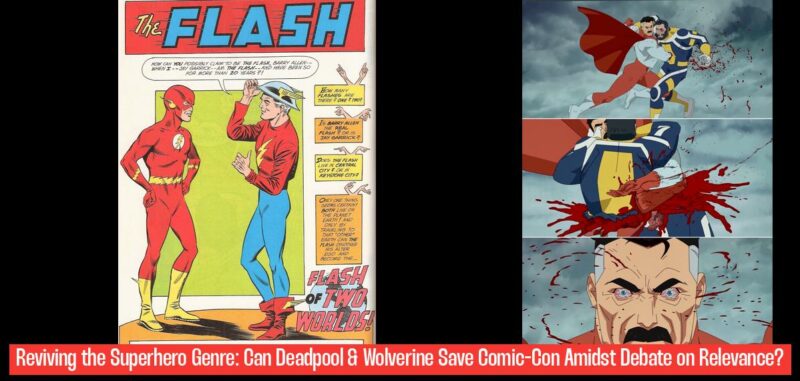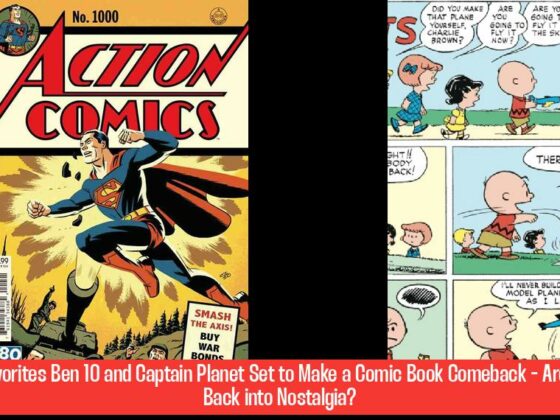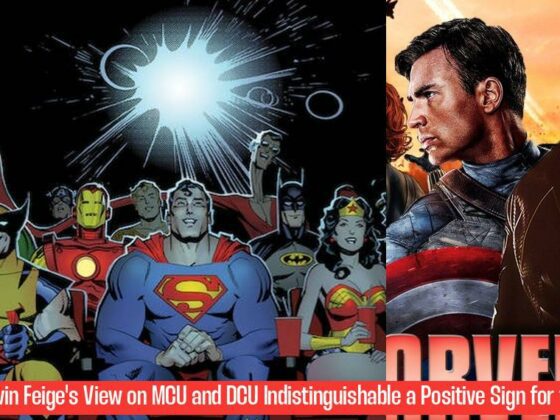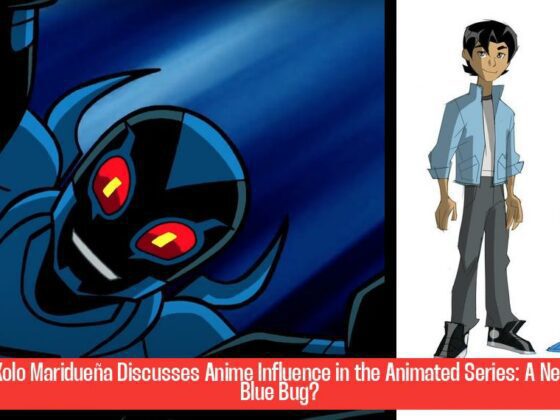Deadpool & Wolverine: A Bold Move to Revive the Superhero Genre Amidst Comic-Con’s Relevance Debate
The superhero genre, once a beacon of cinematic innovation, is facing a crossroads. The relentless stream of superhero films, coupled with the ever-growing fatigue among audiences, has sparked a critical conversation about the genre’s future. Can it survive, or will it succumb to its own overwhelming popularity? Amidst this debate, Marvel Studios’ bold move to release “Deadpool & Wolverine,” a hard-R rated film starring two of the most iconic antiheroes, has ignited a wave of excitement and speculation. This film, set to open on July 26th, is not just a mere superhero flick; it’s a potential game-changer that could resurrect, revitalize, reinvigorate, and rejuvenate the superhero genre.
The film’s premise is simple: Deadpool, the irreverent, fourth-wall-breaking mercenary, and Wolverine, the gruff, berserker mutant, team up for a high-octane adventure. However, the film’s real power lies in its potential to address the very issues plaguing the superhero genre. It’s a movie unafraid to poke fun at the tropes and clichés that have become synonymous with superhero films. This self-awareness is not only refreshing but also strategically designed to appeal to a generation jaded by the endless parade of CGI-heavy, formulaic blockbusters.
The film’s R-rating, a rarity in the superhero genre, is another bold move. It allows the filmmakers to push boundaries, explore mature themes, and deliver a more nuanced and realistic portrayal of these characters. “Deadpool & Wolverine” is not afraid to get dark, gritty, and violent, a stark contrast to the sanitized, PG-13 superhero films that dominate the box office.
The film’s success will depend on its ability to capture the hearts and minds of audiences weary of the superhero genre. It needs to deliver a compelling narrative, memorable characters, and a fresh perspective on the superhero mythos. If it can achieve this, “Deadpool & Wolverine” could become a landmark film, redefining the superhero genre and reigniting the passion of long-time fans.
The Rise of the Antiheroes: A Counter-Narrative to the Superhero Boom
While the superhero genre has reached a saturation point, the rise of the antihero is a welcome development. Gone are the days of pristine, squeaky-clean heroes; audiences crave complexity, moral ambiguity, and characters who embrace the shadows. Deadpool, with his acerbic wit and disregard for convention, is the epitome of the antihero. He’s a flawed, often morally questionable character who nevertheless possesses a charm and a dark humor that resonates with audiences. Wolverine, with his animalistic rage and troubled past, is another embodiment of the antihero. He is a creature of immense power, yet burdened by his own demons.
The pairing of these two iconic characters is a masterstroke. It allows for a dynamic exploration of the antihero archetype, highlighting their shared strengths and flaws. Deadpool & Wolverine are both damaged, driven by their own personal demons, but they are also capable of immense compassion and heroism. Their relationship is a complex one, marred by rivalry and mistrust, yet underpinned by a shared sense of purpose.
The film’s R-rating is crucial in allowing for a more realistic and nuanced portrayal of these characters. Deadpool & Wolverine are not afraid to get their hands dirty; they embrace the violence and the darkness that come with their powers. This raw, uncensored approach resonates with a generation that is tired of sanitized, idealized heroics.
The success of “Deadpool & Wolverine” could signal a shift in the superhero genre, a move away from the idealized heroes of the past and towards a more complex, flawed, and relatable brand of heroism. The antiheroes are here to stay, and they are ready to redefine the superhero landscape.
Comic-Con’s Relevance in the Digital Age: A Crossroads for Pop Culture
Comic-Con, a cornerstone of pop culture for decades, is facing a crossroads. In the digital age, with social media and streaming platforms dominating the entertainment landscape, the relevance of this annual event is being questioned. The rise of online fan communities and the accessibility of content through various digital platforms have blurred the lines between the physical and digital realms.
Yet, Comic-Con remains a powerful force in shaping the cultural conversation around pop culture. It is a place where fans can connect, share their passion, and celebrate their favorite stories. The event provides a platform for studios and creators to unveil new projects, engage with fans, and generate buzz.
The success of “Deadpool & Wolverine” could be a testament to the enduring power of Comic-Con. The film’s release coincides with the event, creating a buzz that will undoubtedly amplify its impact. However, the film’s success is also a reminder of the changing landscape of pop culture. Studios are increasingly turning to digital platforms and social media to connect directly with audiences, bypassing the traditional gatekeepers of the entertainment industry.
The future of Comic-Con is uncertain. It must adapt to the changing landscape of pop culture, embracing the digital age while preserving the core values that have made it a beloved institution. It needs to continue to provide a space for fans to connect, engage, and celebrate the shared love of storytelling. This could involve incorporating more interactive experiences, leveraging social media to create a more immersive experience, and partnering with digital platforms to reach a wider audience.
Beyond the Hype: The Potential Impact of “Deadpool & Wolverine”
“Deadpool & Wolverine” is more than just a superhero film; it’s a cultural phenomenon with the potential to redefine the superhero genre. Its success could trigger a wave of R-rated superhero films, paving the way for more mature and complex storytelling. It could also revitalize Comic-Con, reminding studios and fans alike of the power of a shared experience.
The film’s impact will extend beyond the box office. It will likely spark conversations about the future of the superhero genre, the role of antiheroes in popular culture, and the changing landscape of pop culture. It will also challenge studios to embrace risk-taking and provide audiences with more diverse and compelling narratives.
“Deadpool & Wolverine” is a bold move by Marvel Studios, a gamble that could pay off in a big way. It’s a film that has the potential to revitalize the superhero genre, redefine the antihero archetype, and reignite the passion of long-time fans. It’s a film that could mark a turning point in the history of pop culture, reminding us of the power of storytelling and the enduring appeal of the superhero mythos.
What is the premise of the film “Deadpool & Wolverine”?
The film follows Deadpool, the irreverent mercenary, and Wolverine, the gruff mutant, as they team up for a high-octane adventure.
Why is the release of “Deadpool & Wolverine” considered a bold move by Marvel Studios?
The film is a hard-R rated movie, a rarity in the superhero genre, allowing for exploration of mature themes and a more realistic portrayal of the characters.
How does “Deadpool & Wolverine” aim to address the issues facing the superhero genre?
The film is designed to poke fun at superhero film tropes, offer a fresh perspective, and appeal to audiences fatigued by formulaic blockbusters.
What impact could “Deadpool & Wolverine” have on the superhero genre if successful?
If successful, the film could potentially redefine the genre, reignite fan passion, and serve as a landmark movie that revitalizes the superhero genre.



